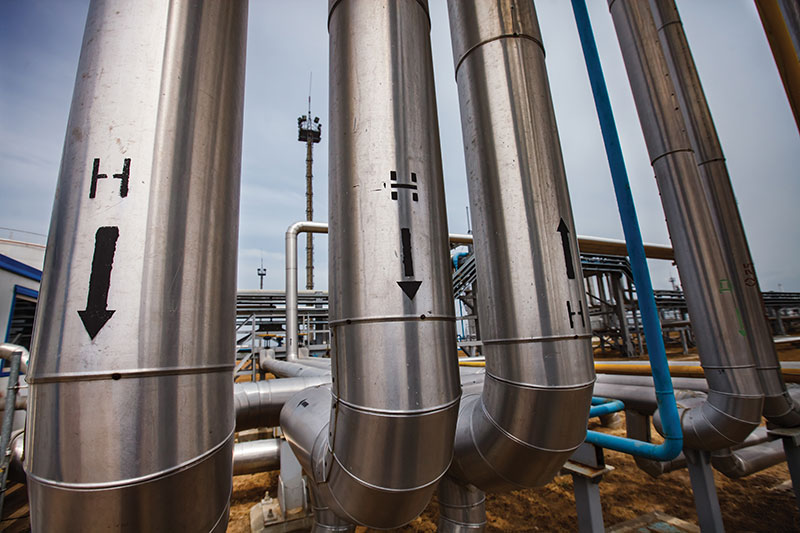Russia-Ukraine War to Accelerate European Hydrogen Transportation Development, Strategist Says
By Maddy McCarty, Senior Digital Editor
Europe and the world in general are still in the introductory phases of a true paradigm shift with respect to the energy transition, said Jacob Shapiro, founder and chief strategist of Perch Perspectives, a business and political consulting firm.
But Russia’s invasion of Ukraine is accelerating that transition, since Europe is speedily moving away from relying on energy supplies from Russia, one of world’s largest exporters of natural gas and oil. The war will bring positive movement for hydrogen research, investment and development, Shapiro said.
“It will accelerate those plans and make it easier for both the European Union and national governments in the EU to spend money on investing in hydrogen transportation infrastructure,” he said.
Already, Norway and Germany agreed to study the transport of hydrogen via a pipeline between the countries. The countries plan to “rapidly” commission a joint feasibility study on the pipeline that could facilitate the large-scale transport of hydrogen from Norway to Germany.
“The amount of European investment, both at the EU and national level, into hydrogen as a potential alternative energy source going forward is going to get a huge boost,” Shapiro said. “Before the war, the EU was aiming to increase the share of hydrogen in Europe’s energy mix from less than 2% as it is currently to 13-14% by 2050. As a result of the war, investment should increase, the share of hydrogen should increase, and it should happen faster than the EU was planning.”
This is possible because Ukraine is not a major player in Europe’s future energy plans. Shapiro said the European Union and Ukraine cannot plan on either being of use to each other in that regard, and Ukraine matters more to Russia than it does to the EU.
“I do not see Ukraine being part of Europe's future hydrogen plans, no matter its potential,” Shapiro said.
This is evident from the European Hydrogen Backbone report, which visualizes 11,600 km (7,207 mi) of hydrogen pipeline by 2030 and 39,700 km (24,668 mi) of hydrogen pipeline by 2040, with 69% converted from natural gas pipelines.
The countries included in this analysis are Germany, France, Italy, Spain, the Netherlands, Belgium, Czech Republic, Denmark, Sweden and Switzerland.
The support for the energy transition likely won’t fade as the war becomes normalized or reaches a solution, Shapiro said.
“I think something fundamental has changed in Europe and that it has seen how vulnerable it is to energy shocks and that hydrogen is one of the only solutions that scales and also meets their emissions goals and concerns about safety,” he said.
However, the vast majority of hydrogen produced in the EU comes from natural gas or coal, Shapiro said. The Norway-Germany announcement noted they would likely start with blue hydrogen, which uses natural gas as a fuel source and captures and stores carbon emissions, for the fastest production.
“Because the EU is still very dependent on Russia for supplies of hydrocarbons, Europe will struggle to make immediate progress,” Shapiro said. “Even though the exigencies of the present demand radical moves to embrace green hydrogen, they also drive European countries to be more open to natural gas than they were before the war.”
Emphasis on LNG, for instance, could take money away from projects that were previously earmarked for green hydrogen when energy supply seemed more secure, he said.
Green hydrogen has a bright future, though, and Shapiro said Europe, due to its unique geography, has more of an incentive than almost any other region to double-down on green hydrogen because it takes advantage of so much of what is already in place.
“But it is not the only option, and it will face challenges from solar, wind, nuclear, hydro, and the like. All have a role to play in decarbonizing the European economy and de-risking its dependence on Russia,” Shapiro said.
Related News
Related News

- Kinder Morgan Proposes 290-Mile Gas Pipeline Expansion Spanning Three States
- Enbridge Plans 86-Mile Pipeline Expansion, Bringing 850 Workers to Northern B.C.
- Three Killed, Two Injured in Accident at LNG Construction Site in Texas
- Tallgrass to Build New Permian-to-Rockies Pipeline, Targets 2028 Startup with 2.4 Bcf Capacity
- TC Energy Approves $900 Million Northwoods Pipeline Expansion for U.S. Midwest
- A Systematic Approach To Ensuring Pipeline Integrity
- U.S. Pipeline Expansion to Add 99 Bcf/d, Mostly for LNG Export, Report Finds
- Enbridge Adds Turboexpanders at Pipeline Sites to Power Data Centers in Canada, Pennsylvania
- Great Basin Gas Expansion Draws Strong Shipper Demand in Northern Nevada
- Cheniere Seeks FERC Approval to Expand Sabine Pass LNG Facility





Comments